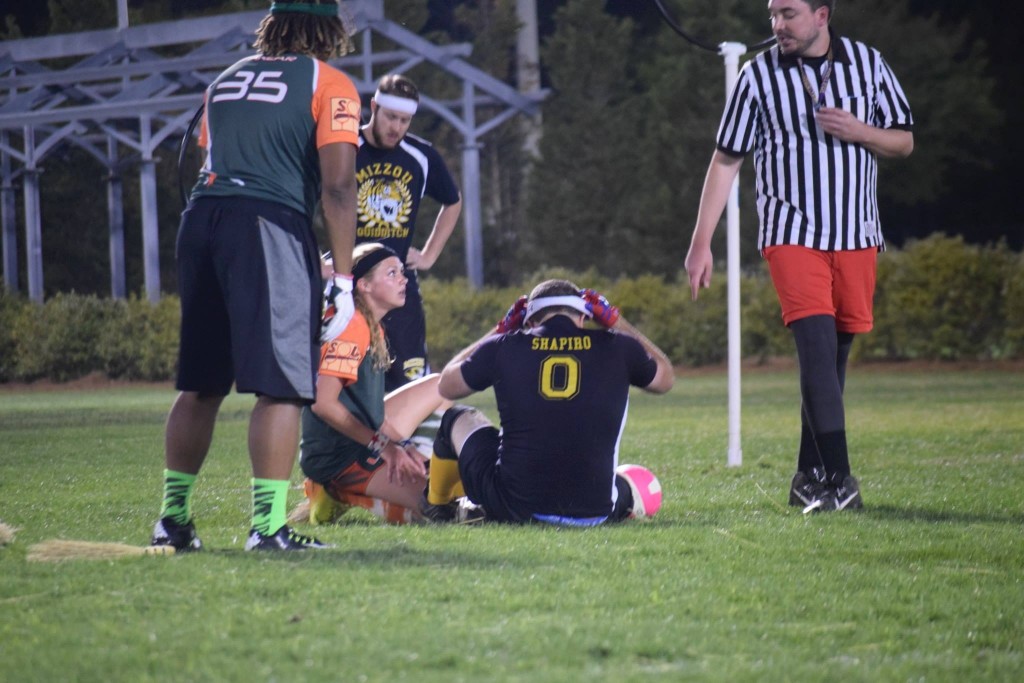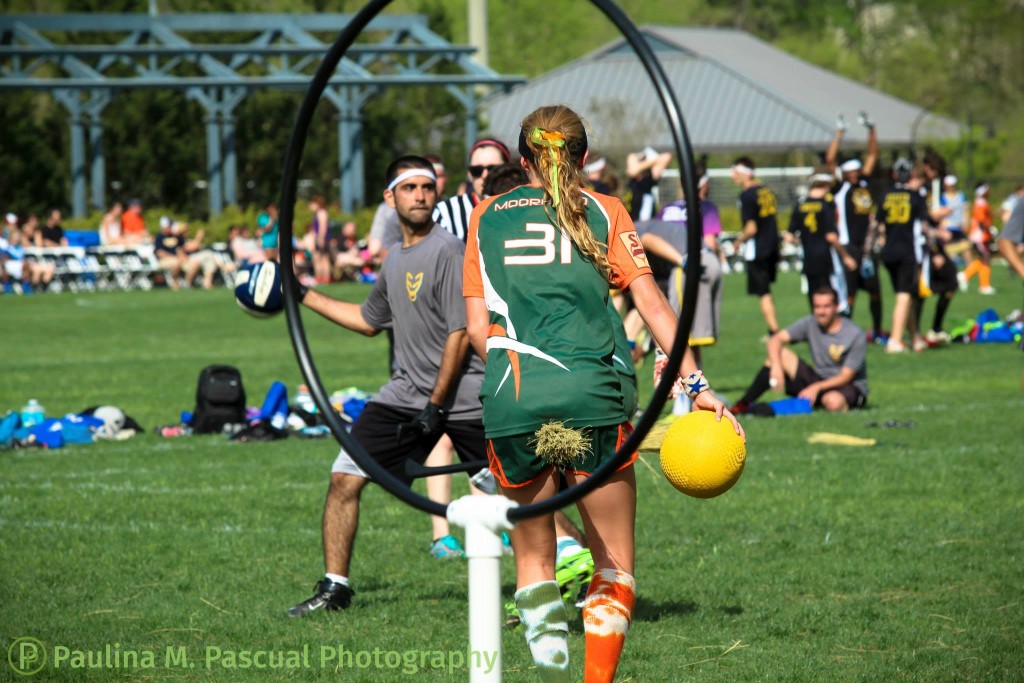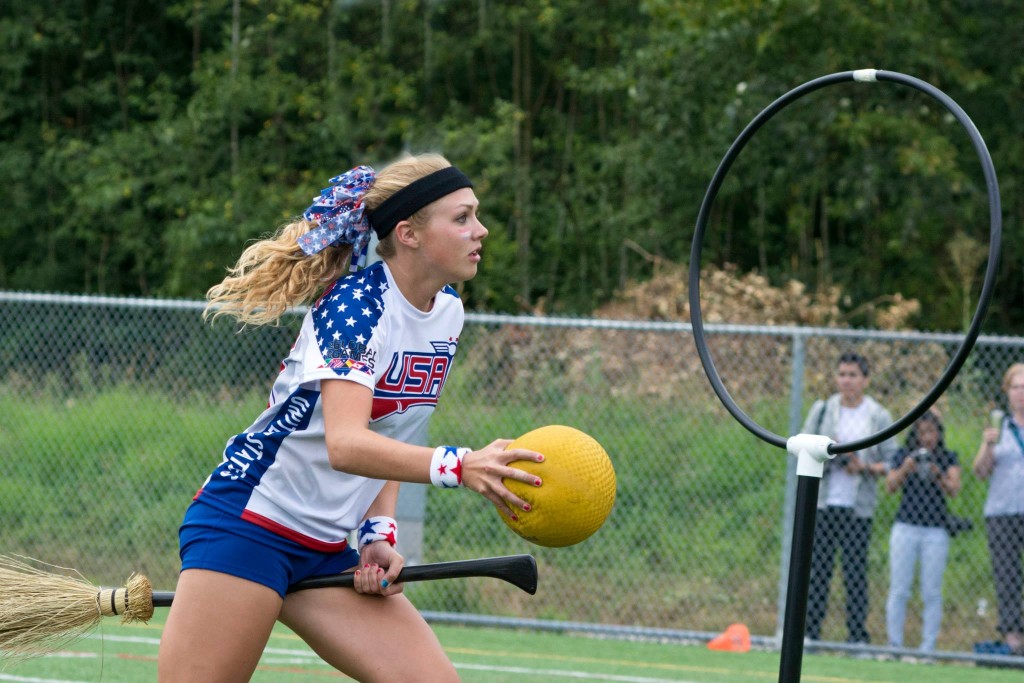Antwerp QC, Much of Belgian Core, Leaves Competitive Quidditch
By Daniel Shapiro
“Are you alright?”
“I’m fine. Why did we stop play?”
That was University of Miami’s Shannon Moorhead talking to me after I got lit up by Miami keeper Tyler Odems, who also plays fullback for the Miami football team. I was apparently very woozy, something I don’t remember, so it’s probably true. I do remember that the first person by my side was Shannon, concerned for my health.

Credit: Adilenne Licona
University of Missouri and Miami had been matched up during World Cup 8 due to the Swiss-style format. It was a game I wanted to avoid happening–I wear my Moorhead Team USA jersey as often as I wear my own Mizzou jersey. I even jokingly went to the captains meeting wearing it, saying I was the Miami captain named Moorhead and wanted to forfeit.
Mizzou was up 40, Miami scored a goal and immediately someone from their bench yelled for their seeker to grab the snitch. He did. They hadn’t waited for the goal whistle that never came—the score had been ruled no good because the chaser that scored had been beat prior.
When the confusion settled, I didn’t celebrate on the sideline. I ran over to Shannon. She was angry and frustrated. Due to the Swiss system, losing this game put Miami in a do-or-die situation for the next day.
We hugged. I told her they were still in it. She calmed down. Then we went to our respective teams for the post-game handshake. We hugged again.
World Cup 8 was the first time we actually got to meet in person. It was the first time we played one another. It will also be the last.
Shannon Moorhead—captain of the University of Miami, former Team USA beater, two-time South Regional Champion, fiery competitor and one of my best friends—has officially retired from quidditch.

Credit: Paulina M. Pascual
Shannon and I have only actually been able to interact in person twice—at World Cup 8 and at Midwest Fantasy 2015, where I was mostly drugged up on pain meds due to knee surgery three days prior. It’s funny because we grew up less than two hours away from one another in Chicagoland and had a mutual friend long before either of us joined quidditch. So of course, we become close friends once we move to Miami and Columbia, Missouri.
It’s part of what makes quidditch great—the friendships. Ours developed after the 2014 Global Games Team USA roster was announced. I was put in charge of telling each of the players that they had made it. When we added one another on Facebook and discovered our mutual friend, our friendship started and has just been rolling since.

Credit: KS Goh
Despite having broken her collarbone during Swamp Cup in January, 2014 and missing her regional, we still named Shannon to Team USA. She performed at World Cup VII like one of the best in the game, so we had no qualms about our decision.
Shannon’s odds for making the 2016 iteration of the roster were overwhelmingly favorable. She’s one of the biggest stars of the south—if not the biggest. And she’s a former member that hasn’t lost any of her skill.
So why walk away from not only World Cup 2016, but the remainder of her season with Miami? Injury concerns.
When Miami chaser Sean Beloff needed his jaw wired shut for six weeks after this year’s Swamp Cup, it was a wakeup call for Shannon.
“If I get hurt, I can’t do my internship,” she told me. “I can’t do my other research. When Sean got the broken jaw, it derailed his life for six weeks. I can’t have that happen.”

Credit: Sami Kanterperson
I told her I supported her decision—it’s one I’ve been wrestling with as I approach my final year of graduate school. Injuries make life difficult, so as supportive as she has been through my rehab, I’m as supportive of her decision to walk away.
“Hardest decision I’ve ever had to make,” she said.
I wanted to talk her out of it—to tell her to ride off into the sunset with another gold medal around her neck. But as with other sports, athletes are getting bigger, stronger and faster.
USQ has spent the past few years placing a much larger emphasis on player health and safety—rules have been developed to prevent injury, like how a player can’t continue to charge after being beat and then claim natural motion. Mouth guards were instituted and we all adapted, for the better. Each team must have a coach attend a concussion seminar. The league now offers accident insurance as part of its $50 membership fee, one I’m glad to have and willing to pay less than the cost of “Fallout 4” for.
Yet, sometimes, we have to walk away.
Until quidditch grows into a full-fledged professional sport where players are paid, injuries will always loom in the back of players’ heads as they leave college and prepare themselves for their professional careers. Even NFL players, such as Calvin Johnson earlier this week, walk away.
Shannon is hanging up her cleats as she enters the next stage of her life. We’ll still talk and probably interact in person—we both visit Chicago for the holidays. But quidditch is losing one of its brightest stars.
She added one more thing when she told me she was leaving.
“I already miss it so much.”
Daniel Shapiro is currently a graduate student at the Missouri School of Journalism, pursuing a master’s degree in documentary journalism. He graduated in 2015 with a bachelor’s of journalism degree from the same institution. He can be contacted via Twitter @DanielShapiro19 or email at DanielShapiro19@gmail.com.
Archives by Month:
- May 2023
- April 2023
- April 2022
- January 2021
- October 2020
- September 2020
- July 2020
- May 2020
- April 2020
- March 2020
- February 2020
- January 2020
- December 2019
- November 2019
- October 2019
- August 2019
- April 2019
- March 2019
- February 2019
- January 2019
- November 2018
- October 2018
- September 2018
- August 2018
- July 2018
- June 2018
- April 2018
- March 2018
- February 2018
- January 2018
- November 2017
- October 2017
- July 2017
- June 2017
- May 2017
- April 2017
- March 2017
- February 2017
- January 2017
- December 2016
- November 2016
- October 2016
- September 2016
- August 2016
- July 2016
- June 2016
- May 2016
- April 2016
- March 2016
- February 2016
- January 2016
- December 2015
- November 2015
- October 2015
- September 2015
- August 2015
- July 2015
- June 2015
- May 2015
- April 2015
- March 2015
- February 2015
- January 2015
- December 2014
- November 2014
- October 2014
- September 2014
- August 2014
- July 2014
- May 2014
- April 2014
- March 2014
- February 2014
- January 2014
- November 2013
- October 2013
- September 2013
- August 2013
- July 2013
- June 2013
- May 2013
- April 2013
- March 2013
- February 2013
- January 2013
- December 2012
- November 2012
- October 2012
Archives by Subject:
- Categories
- Awards
- College/Community Split
- Column
- Community Teams
- Countdown to Columbia
- DIY
- Drills
- Elo Rankings
- Fantasy Fantasy Tournaments
- Game & Tournament Reports
- General
- History Of
- International
- IQA World Cup
- Major League Quidditch
- March Madness
- Matches of the Decade
- Monday Water Cooler
- News
- Positional Strategy
- Press Release
- Profiles
- Quidditch Australia
- Rankings Wrap-Up
- Referees
- Rock Hill Roll Call
- Rules and Policy
- Statistic
- Strategy
- Team Management
- Team USA
- The Pitch
- The Quidditch Lens
- Top 10 College
- Top 10 Community
- Top 20
- Uncategorized
- US Quarantine Cup
- US Quidditch Cup
